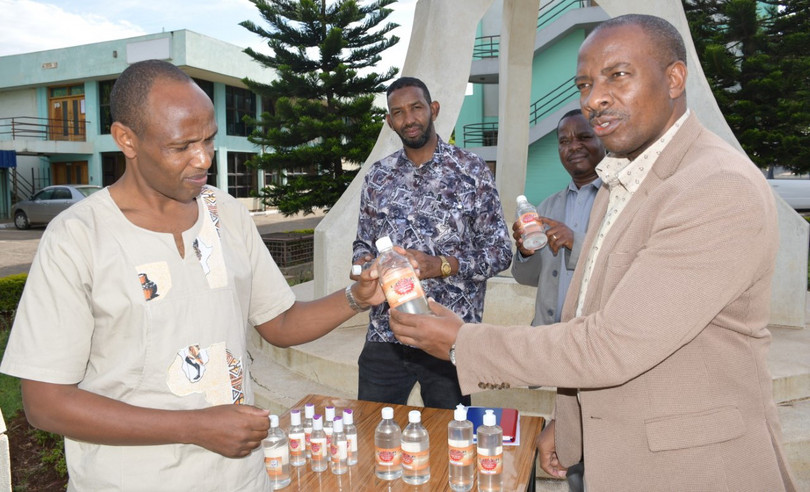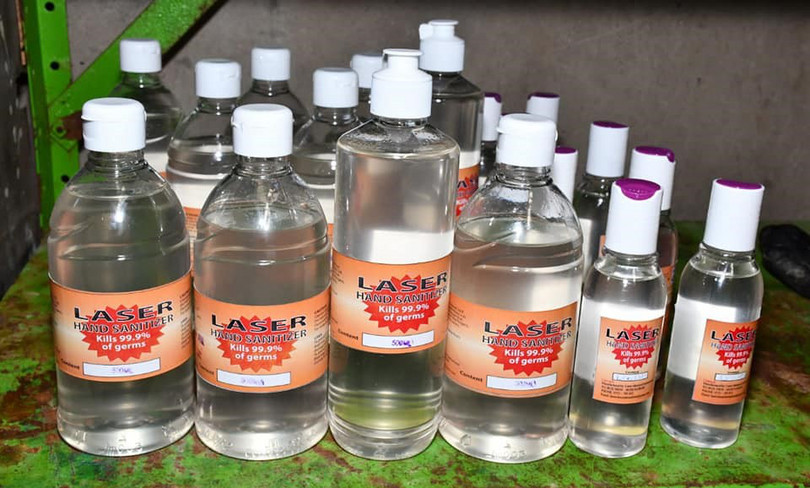Counterfeit and substandard hand sanitizers have flooded markets in eastern and southern Africa during the coronavirus pandemic.
On 6 July 2020, protesters in Kenya’s Kisii county set fire to a police station after police shot and killed a hawker accused of selling fake hand sanitizers in an open-air market.1 The killing was an extreme example of the Kenyan state’s efforts to crack down on individuals and companies seeking to profit from the coronavirus pandemic by manufacturing substandard sanitation products.
When Kenya’s first case of COVID-19 was recorded on 13 March 2020, hand sanitizers quickly began disappearing from store shelves. In desperation, Kenyans began crossing into Uganda to purchase sanitizers.2 In response, the Kenya Ports Authority released 18 containers of ethanol to supply the domestic manufacture of sanitizers. The consignment, which totalled 396 000 litres, had been held up at the port of Mombasa and at various container freight stations.3 By the following month, independent sanitizer brands had begun appearing in Kenya, but many were quickly revealed as substandard. One individual canvassed by the GI-TOC said that she refused to use the hand sanitizer provided at the entrance of a supermarket in Nairobi’s central business district, preferring soap and water instead. She had found an experience with one independent brand particularly unappealing. ‘It cost me only KES 50 (US$0.50),’ she said, ‘but when I used it for the first time, there was a burning sensation on my hands. Its scent was very powerful and irritating. It was also very sticky. I am not sure if it will protect me from COVID-19.’4 Her experience with hand sanitizers is echoed by many Kenyans who have unknowingly purchased substandard or counterfeit brands.
Counterfeit hand santitizers proliferate in Kenya

A hand sanitizer manufactured by Damajoy Chemicals – a company whose existence the GI-TOC was not able to verify.
© Dorcas Wangira/GI-TOC
On 21 March, the Kenya Bureau of Standards (KEBS) published a list of 36 locally manufactured sanitizers that met Kenyan requirements, including a minimum alcohol content of 60%.5 Yet counterfeit hand sanitizers are being sold openly on the busy streets of Nairobi, with matatu (public minivans) operators and passengers often the target market. These brands typically cost around KES 100 (US$1), and smaller quantities sell for half the price.
In early June, the GI-TOC obtained 12 samples of hand sanitizer from street sellers in Nairobi’s city centre. The products were lacking manufacturers’ physical addresses, dates of manufacture or expiry, and in some cases all three. The GI-TOC was not able to verify the existence of some of the stated manufacturers, such as ‘Damajoy Chemicals.’ Only three brands bore the KEBS Standardization Mark (SM), and the lack of proper seals in the packaging also pointed to likely counterfeiting. According to one local sanitizer manufacturer, the KEBS SM is often forged by opportunistic manufacturers.6
Companies with no physical address are difficult to track down, so KEBS opted to target retail outlets in a bid to stymy the distribution of the fake sanitizer products.7 On 8 April, KEBS ordered the immediate withdrawal of 28 sanitizer brands from shop shelves following a crackdown carried out in conjunction with the Kenyan Directorate of Criminal Investigations.8 On 17 May, KEBS withdrew its quality-assurance markings for eight brands of hand sanitizers that had been assessed as substandard.9 Senior KEBS official Benard Nguyo told the GI-TOC that the samples companies provided for quality testing were often not of the same composition as the products supplied to retail outlets.10 When KEBS randomly tested samples of the same brands found on shelves, they discovered lower alcohol contents.11
Johnson Adera, deputy director of Legal Affairs at Kenya’s Anti-Counterfeit Authority (ACA), told the GI-TOC that fake sanitizers were more common in rural areas due to the reduced presence of ACA agents and police.12 The GI-TOC’s understanding is that the manufacturing of substandard sanitizers and the counterfeiting of known brands primarily takes place on a small-scale, cottage-industry level. Between March and June, the ACA claimed that it had seized KES 13 million (US$130 000) of counterfeit COVID- 19-related products, including face masks, testing kits and sanitizers.13


The Kenya Bureau of Standards market surveillance team shows the results of a raid on an unlicensed hand-sanitizer manufacturer, Laser Chemicals, in Nairobi, 28 March 2020.
Source: Social media.
Ugandan and Tanzanian hand sanitizers also fail to meet standards
In Uganda, the Uganda National Bureau of Standards (UNBS) mandates that alcohol content in sanitizers should be at least 60%. Moreover, labelling must display the manufacturer’s name and address, as well as general instructions for use, hazard and toxicity warnings and an expiry date.
The UNBS regularly halts the production of substandard and fake sanitizers and confiscates those being sold. On 19 March, Ugandans Stephen Night and his wife Aisha Namawejje, the owners of Archery Laboratory Supply, were arrested following a tip-off that they were manufacturing fake sanitizers.14 It was the second time in the span of a few days that Night had been arrested on the same charge.15 On 2 April, the UNBS asked the public to refrain from purchasing 15 brands because they had failed the alcohol-content and other quality-assurance tests.
Fred Muwema, director of Legal and Corporate Affairs at the Anti-Counterfeit Network (ACN) Africa, told the GI- TOC that the skyrocketing demand for hand sanitizers has led to a proliferation of counterfeit and substandard hand sanitizers on the Ugandan market.16 ‘Illegal trade in hand sanitizers is part of the wider trade in counterfeit [goods], which is both intrastate and cross-border, or transnational. One should still expect a movement of essential fast-moving products like hand sanitizers between the two countries even under COVID-19 lockdown,’ Muwema said.17
An online survey conducted between 31 March and 10 May by ACN Africa revealed that out of approximately 500 respondents, 40% reported using sanitizers which were not on the UNBS approved list. In response, ACN Africa launched a social-media campaign dubbed ‘Fight COVID-19 with genuine products’.
In Tanzania, hand sanitizers must likewise contain an alcohol content of at least 60%. However, according to local media some brands contain alcohol percentages below 40%.18
Substandard hand sanitizers supplied to South African schools
While eastern African countries have managed to avoid major public-health incidents from counterfeit COVID-19 products, substandard sanitizers have been linked to the spread of the virus in some South African schools. In June, South Africa was rocked by scandal when Makaula Senior Secondary School in KwaBhaca, Eastern Cape province, was shut down after 204 staff and students tested positive for COVID-19 (out of a total of 330 tested).19 The principal of the school was airlifted to hospital after he developed serious health complications.20
Roderick Walker, a professor of pharmaceutics at Rhodes University in Eastern Cape, tested samples of hand sanitizers supplied to Makaula Secondary and nine other schools in the same district. Walker’s laboratory analyses found alcohol contents ranging between 4.1% and 57.6%. While the sanitizer supplied to Makaula Secondary contained the highest alcohol content of those tested (57.6%), it still fell far short of the minimum 70% required under South African regulations.21
During parliamentary questions, the cabinet minister for education in the Eastern Cape provincial government disclosed that his department had paid the supplier ZAR 4 665 (US$280) per 25 litres of sanitizer.22 A member of the provincial legislature responded that this price was five times higher than the standard retail price for sanitizers.23 As the number of COVID-19 cases continued to rise across South Africa, President Cyril Ramaphosa announced that schools would close down for at least one month from 27 July.24
While the manufacture of counterfeit and substandard sanitizers in eastern African countries is not yet known to have resulted in similarly disastrous outbreaks of COVID-19, the developments in South Africa should serve as a cautionary example. Corruption in African states, particularly surrounding tendering and procurement, may have particularly grave public-health consequences during the pandemic.
Notes
-
Humphrey Malalo, Kenyan protesters set fire to police station after killing, Reuters, 6 July 2020, https://www.reuters.com/article/us-kenya-police/kenyan-protesters-set-fire-to-police-station-after-killing-idUSKBN2472F3. ↩
-
NTV Kenya, Kenyans at Busia border cross into Uganda in search for hand sanitizers, YouTube, 17 March 2020, https://www.youtube.com/watch?v=HiGh-GYI_1s. ↩
-
Martin Mwita, KPA releases impounded ethanol for manufacture of sanitizers, The Star, 23 March 2020, https://www.the-star.co.ke/business/kenya/2020-03-23-kpa-releases-impounded-ethanol-for-manufacture-of-sanitizers/. ↩
-
Interview with a Nairobi resident, 20 May 2020. ↩
-
Amina Wako, Kebs publishes list of approved sanitiser manufacturers, Nairobi News, 21 March 2020, https://nairobinews.nation.co.ke/editors-picks/kebs-publishes-list-of-approved-sanitiser-manufacturers. ↩
-
Interview with a local hand-sanitizer manufacturer, 23 July 2020, by text message. ↩
-
Eddy Mwanza, Kenyans exposed as Kebs unearths 28 fake sanitisers, Kenyans.co.ke, 9 April 2020, https://www.kenyans.co.ke/news/51834-kenyans-exposed-kebs-unearths-28-fake-sanitisers. ↩
-
Ibid. ↩
-
Victor Amadala, Kebs says eight sanitiser brands do not meet set standards, The Star, 18 May 2020, https://www.the-star.co.ke/business/kenya/2020-05-18-kebs-says-eight-sanitiser-brands-do-not-meet-set-standards/. ↩
-
Interview with Benard Nguyo, KEBS acting director of Quality Assurance, Nairobi, 4 May 2020. ↩
-
Ibid. ↩
-
Interview with Johnson Adera, Nairobi, 3 June 2020. ↩
-
Anti-Counterfeit Authority, ACA destroys goods worth 27M KES in Athi River, 3 June 2020, https://www.aca.go.ke/media-center/news-and-events/219-aca-destroys-goods-worth-27m-kes-in-athi-river. ↩
-
New Vision, Couple arrested over fake coronavirus sanitizer, 19 March 2020, https://www.newvision.co.ug/news/1516779/couple-arrested-fake-coronavirus-sanitizer. ↩
-
Paul Ampurire, Police arrests man who was making fake sanitizers in Makindye, SoftPower News, 19 March 2020, https://www.softpower.ug/police-arrests-man-who-was-making-fake-sanitizers-in-makindye/. ↩
-
Interview with Fred Muwema, 4 June 2020, by phone. ↩
-
Ibid. ↩
-
Gadiosa Lamtey and Fortune Francis, Hand sanitisers out of stock amid coronavirus pandemic, The Citizen, 22 March 2020, https://www.thecitizen.co.tz/news/1840340-5500052-audmmv/index.html. ↩
-
Mpumzi Zuzile, Principal of Eastern Cape school where 200 pupils tested positive airlifted to hospital, TimesLIVE, 1 July 2020, https://www.timeslive.co.za/news/south-africa/2020-07-01-principal-of-eastern-cape-school-where-200-pupils-tested-positive-airlifted-to-hospital/. ↩
-
Ibid. ↩
-
Prega Govender, Virus-hit E Cape school supplied with substandard sanitiser, TimesLIVE, 17 July 2020, https://www.timeslive.co.za/news/south-africa/2020-07-17-virus-hit-e-cape-school-supplied-with-substandard-sanitiser/. ↩
-
Ibid. ↩
-
Ibid. ↩
-
Sihle Mlambo, Ramaphosa closes public schools for a month during Covid-19 peak, matrics for one week, IOL, 23 July 2020, https://www.iol.co.za/news/politics/ramaphosa-closes-public-schools-for-a-month-during-covid-19-peak-matrics-for-one-week-350743a8-134f-4bfb-b5a1-e801f5918498. ↩
